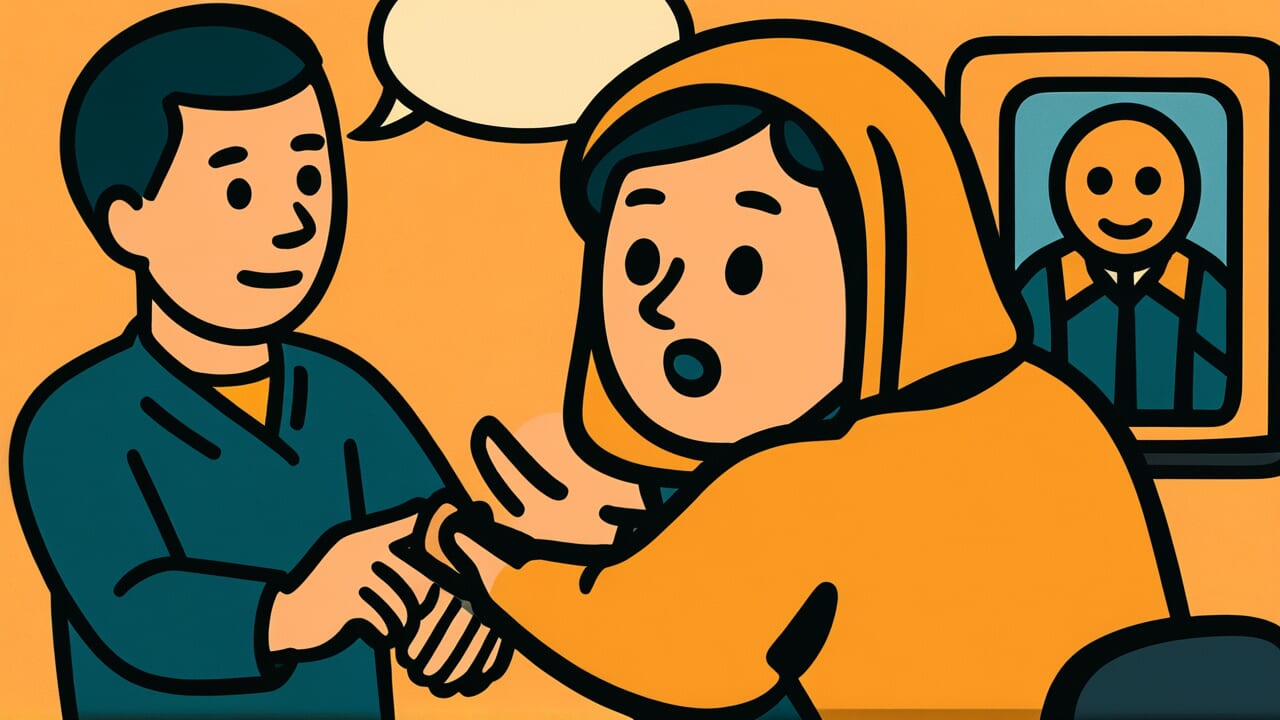How to Read “If you don’t know, ask someone”
Shirazuba hito ni toe
Meaning of “If you don’t know, ask someone”
This proverb teaches that you should ask others without embarrassment when you don’t know something.
It means you can gain correct knowledge by honestly asking someone who knows, rather than leaving your confusion unresolved.
This saying is used when entering a new environment or facing something unfamiliar in work or study.
It’s especially common in contexts where asking questions honestly from the start is better than pretending to know and failing.
Today, we can look up anything on the internet. But the value of asking people directly hasn’t changed.
Living knowledge from experienced people and specific advice for your situation can’t be found through searching alone.
This proverb still teaches us the importance of learning with humility and the value of learning through communication with others.
Origin and Etymology
There are various theories about the exact source of this proverb. But it has been passed down as an ancient Japanese teaching.
Looking at the word structure, “shirazuba” means “if you don’t know,” showing a condition. “Hito ni toe” is a command form meaning “ask someone.”
The essence of learning is condensed in this simple expression.
Traditional Japanese education emphasized learning from masters and seniors.
In Edo period temple schools, students were encouraged to ask their teachers without shame when learning reading, writing, and arithmetic.
In that society, knowledge was often passed orally from person to person, not just through books. Asking questions was a fundamental learning attitude.
Japanese scholarship, influenced by Confucianism, includes the phrase “fuchi kamon.”
This means “not being ashamed to ask those below you” and teaches the attitude of learning humbly.
This proverb likely grew within East Asian scholarly culture and became established as a uniquely Japanese expression.
Our ancestors packed the courage to admit ignorance and the importance of learning honestly into these few words.
Usage Examples
- If you don’t know how to use the new software, “if you don’t know, ask someone” – it’s faster to have a senior teach you
- They say “if you don’t know, ask someone” about cooking tips, so maybe I’ll ask my mom
Universal Wisdom
The proverb “If you don’t know, ask someone” contains a fundamental truth about human growth.
It shows that admitting ignorance is the first step toward true learning.
Humans have a strange quality. We feel ashamed of not knowing things and try to hide it.
Pride gets in the way, making us fear being thought of as ignorant. But this fear is the greatest barrier to our growth.
Our ancestors saw through this human weakness.
This proverb has been passed down for so long because human society has fundamentally developed through “knowledge sharing.”
What one person can know is limited. But by asking others and receiving teaching, we can instantly make our own the wisdom accumulated over generations.
This is a remarkable ability that only humans possess.
Thinking more deeply, this proverb also reveals the essence of human relationships.
Asking questions means respecting others and acknowledging their knowledge and experience.
Those who teach also feel their own value when relied upon.
In other words, the act of “asking” isn’t just exchanging information. It’s an activity that creates connections between people.
The courage to admit ignorance actually enriches human relationships and becomes a bridge passing society’s wisdom to the next generation.
This deep insight is what makes this proverb timeless.
When AI Hears This
The amount of information a human brain can remember in a lifetime is limited.
Even studying alone continuously, you can only store knowledge equivalent to tens of thousands of books at most.
However, the act of “asking someone” is a technique that instantly breaks through this individual memory capacity limit.
From an information theory perspective, questions are extremely efficient data compression.
For example, the short question “How do you read this kanji?” (a few dozen bytes) gives you access to knowledge (several megabytes) that took someone years to acquire.
You’re compressing the cost and time of learning by yourself to one-thousandth.
The same principle that lets search engines instantly extract only needed information from vast web pages happens in human conversation too.
Even more interesting is the phenomenon where information accuracy increases as you ask more people.
If you ask three people the same thing, the probability of reaching the correct answer through majority vote jumps dramatically.
This is a statistical effect called “wisdom of crowds.” Even if individual knowledge contains errors, combining multiple information sources cancels out the noise.
Don’t stay confined to the small hard drive of one brain. Connect to the massive cloud storage that is all humanity.
Questions are the network cable for doing that.
Lessons for Today
What this proverb teaches modern people is that humility is the strongest weapon.
In an age where everyone can be a broadcaster on social media, the temptation to pretend you know things is stronger than ever.
But truly wise people are those who can honestly admit their ignorance.
When you start at a new workplace, learn a new subject at school, or try something new as a hobby, here’s the key to not stumbling at the first step.
Ask questions immediately when you don’t understand something.
Things you might struggle with for a week can be solved in one minute by asking someone experienced.
That one minute of courage will save you many hours.
And don’t forget this. When you ask someone a question, it’s also a joy for them.
People want to be helpful to others. Your words “please teach me” might open the door to a new relationship.
Not knowing something isn’t shameful. Leaving it unknown is the real loss.
Starting today, when you don’t understand something, have the courage to ask someone.



Comments